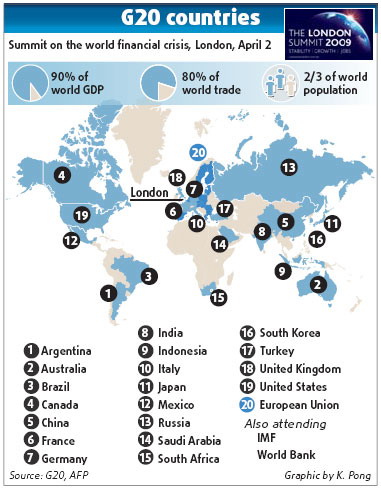|
|

G20 London Summit > Commentary
|
Crisis an opportunity for China: Oxford scholarsBy You Nuo and Fu Jing (China Daily)
Updated: 2009-03-30 09:56 LONDON: It is easy to appreciate history at Oxford University as one passes by one old stone hall after another, some flanked by tall, blossoming magnolia trees rarely seen in Asian cities. Dr Albert Park, reader in Chinese Economics, talks about the formation of around 40 colleges at Oxford while Eric Thun, Llecturer in Chinese Business Studies, points out that the university boasts some 40 China specialists on its faculty - probably a larger China research team than in any other university in the world.
 Park and Thun are young members of the old university's China research team. They represent Oxford's growing interest in China's social and economic changes, anticipating the country's rising importance as seen by the world today. Both take three-five field study trips to China every year and talk about business halfway around the globe as if it were a family matter - from issues of poverty relief and industrial reform to the five-month-old economic stimulus package and Central bank governor Zhou Xiaochuan's ideas about future international currency reform, published last week in the run-up to the G20 summit in London on April 2. According to Park, rapidly changing circumstances are providing China with opportunities to become more influential as other nations look to Beijing to lead the world out of the financial crisis. "Since the crisis broke," he said, "China's response has been noteworthy in not just the size of its stimulus package in proportion to its economy, but also in its effective implementation." The "generally healthy" banks are an advantage and may help China recover more quickly than other countries, he said. The world is also looking at China to play a bigger role in addressing some important issues, Park said. As critical pressure that China used to face on financial liberalization and currency management eases, there is an opportunity for Beijing to demonstrate more clearly its constructive role. "China's first obligation, of course, will be to manage itself well. And along with that, having honest and frank discussions internally about what it should do and how much it should do globally," Park said. Park viewed Governor Zhou's idea - about a future shift from the dollar as the international currency to something based on a basket of currencies - as "provocative". He said the debate over how much should China contribute to the International Monetary Fund (IMF) and other global crisis-control efforts shows that people are open to new ideas and are asking new questions. There is some validity in fears that China may be giving too much, he said. As one of the scholars involved in a World Bank project on poverty in China, he said there are still millions of poor in the country. So "it is definitely a challenge" that China is being asked to help other countries and provide more resources to the IMF. However, he pointed out that because of China's global business interests it would be beneficial for Beijing to help resolve the crisis anywhere in the world and take on the role of a provider of assistance. Thun said that while China is earning a fair amount of respect for its stimulus package, the most important challenge for the country is not about growth in terms of gross domestic product, but about whether the growth is sustainable. "China has a chance to do better than single-mindedly chase growth," said Thun, a specialist in China's industrial reform. "It's not just growth. It's good growth, sustainable growth." He stressed that the key to growth lies in its quality. More specifically, it remains to be seen whether China can keep up growth without compromising on energy-efficient and environment-friendly industrial operations. How China responds to this question will essentially depend on whether it decides to react to the world financial crisis by putting up a pure defense or by pushing forward its economic reform at the same time, Thun said. He noted that during the Asian financial turmoil of the late 1990s, China was successful in maintaining growth while forging ahead with its reform of State-owned enterprises despite massive urban unemployment. "Good growth in China would require a clearer distinction on an industry-by-industry level, by giving incentives to capacities that are energy efficient, environmentally friendly and competitive in the long run, and disincentivizing those that are wasteful and not sustainable," Thun said. The inevitable shift from an export-led growth model that China has adopted since the 1980s may be conducive to domestic companies' rise in the value chain, he pointed out. In export-led growth, it is more convenient for Chinese companies to fit themselves into the umbrellas of multinational corporations and to produce for the overseas market. In this case, the requirement for managerial skills is low, as many aspects like logistics and marketing are taken care of by the corporations. But the profit margin for the Chinese companies in their capacity as suppliers remains low, Thun said. Chinese companies are more competitive in the domestic market. A growth model with a greater emphasis on the domestic consumer market will therefore encourage Chinese companies to become more flexible, and exploit China's untapped potential, moving up the value chain more quickly, he said. "If such a change comes along, then a structural re-balance - a goal that China has long been hoping for - may become a reality," he said. Since China is free from the burden of a credit squeeze that is threatening many other economies, and since the downside of continuing export-led growth is clearer than ever, China can use the crisis as an opportunity to meet some of the original goals of its reform, Thun said. |